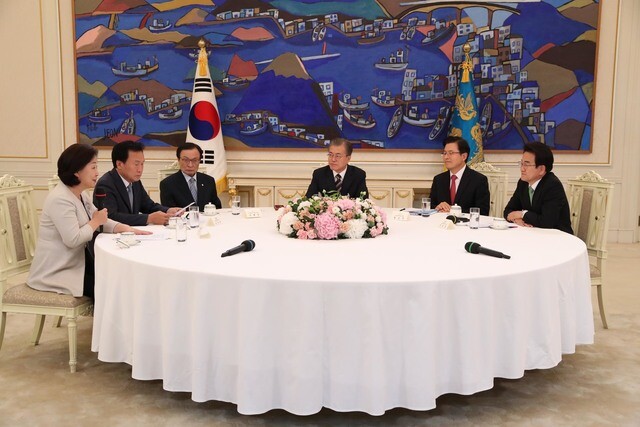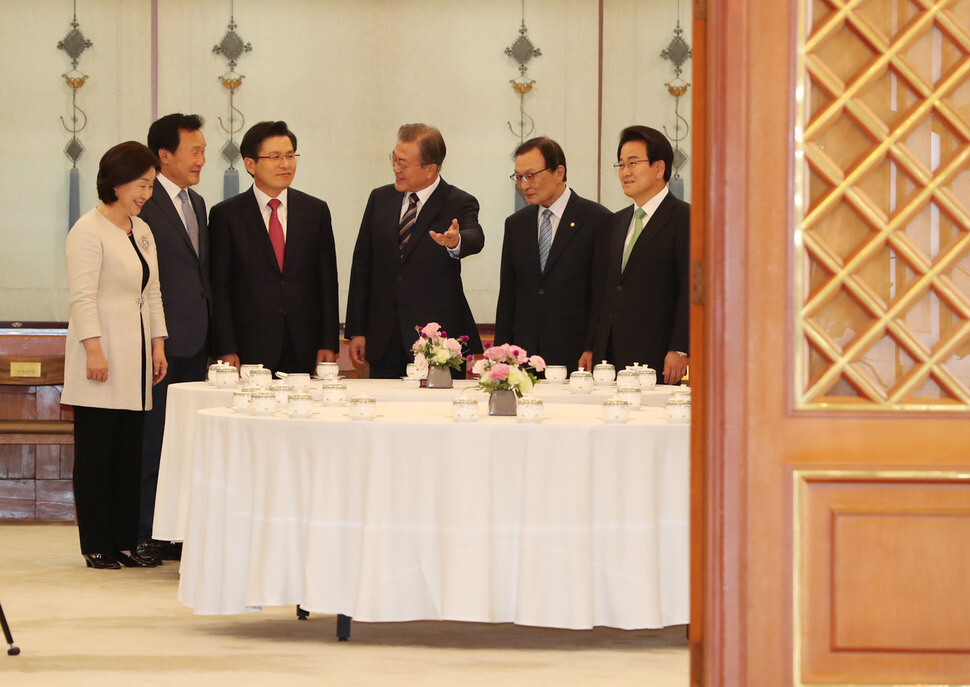hankyoreh
Links to other country sites 다른 나라 사이트 링크
Moon and leaders of five political parties urge Japan to immediately withdraw economic retaliation measures

South Korean President Moon Jae-in and the leaders of five political parties declared Japan’s export control measures to be “unjust economic retaliation” and pledged cooperation across party lines in a July 18 meeting at the Blue House.
In a joint statement adopted after the meeting that day, Moon and the five party leaders said, “We urge the Japanese government to immediately withdraw its economic retaliation measures and, as additional measures such as [South Korea’s] removal from [Japan’s] white list would damage South Korea-Japan relations and security cooperation in Northeast Asia, we urge it to pursue a diplomatic resolution.” They also agreed to set up an emergency cooperation body to respond at the pan-national level, but did not reach an agreement on other issues such as passage of the supplementary budget.
Following the invitational dialogue with party leaders at the Blue House at 4 pm that day, spokespeople for Moon and the five party leaders individually announced that the participants had held in-depth discussions to share their positions on Japan’s export control measures and agreed on four main points. The meeting lasted for three hours, extending significantly longer than the initially scheduled two.
In their joint statement, Moon and the five party leaders urged the Japanese government to withdraw its economic retaliation measures and abandon plans to remove South Korea from its white list.
“The administration and the ruling and opposition parties share the view that Japan’s export control measures constitute unjust economic retaliation in violation of the free trade order and are measures that serious damage the amicable, mutually beneficial relationship between South Korea and Japan,” the statement said.
It also said, “The administration and the ruling and opposition parties will work together to strengthen the fundamentals of the national economy and the competitiveness of the materials, components, and equipment industries.”
“We will also be establishing and operating an emergency cooperation body for a response at the pan-national level,” it continued.

Suggestions of abandoning GSOMIA if S. Korea removed from white list
During the meeting, Sim Sang-jeung, leader of the Justice Party, suggested, “If Japan removed South Korea from its white list, our administration should seriously consider abandoning the South Korea-Japan General Security of Military Information Agreement (GSOMIA).” In connection with this, Chung Dong-young, leader of the Party for Democracy and Peace, said after the meeting that “while it is phrased euphemistically, the statement expresses that GSOMIA could be abandoned if Japan pursues additional retaliation measures.” In a previous briefing for the five party leaders, Blue House National Security Office Director Chung Eui-yong predicted additional measures to come from Japan.
“We’re anticipating that [Japan] will announce its exclusion [of South Korea] from the white list on July 31 or Aug. 1,” he said.
The “emergency cooperation body” used to respond at the pan-national level is to be operated jointly by the administration and ruling and opposition parties. Ko Min-jung, spokesperson for the Blue House, explained, “While we will need to have more discussions going ahead on how to combine the specific units, everyone agreed on the need for an emergency cooperation body to be established and operated.”
Other response plans discussed included holding a South Korea-Japan summit and sending a special envoy. Ko quoted President Moon as repeatedly stressing the point that “an agreement between governments does not seem to be enough, judging from the situation with the South Korea-Japan comfort women agreement” and that “we learned the lesson that it needs to be acceptable to the victims and have the public’s support.”
Despite Moon’s message that day urging of the National Assembly passage of the supplementary budget, no agreement was reached due to objections from Hwang Kyo-ahn, leader of the Liberty Korea Party.
Lee Wan and Seong Yeon-cheol, staff reporters
Please direct comments or questions to [english@hani.co.kr]

Editorial・opinion
![[Editorial] Does Yoon think the Korean public is wrong? [Editorial] Does Yoon think the Korean public is wrong?](https://flexible.img.hani.co.kr/flexible/normal/500/300/imgdb/original/2024/0417/8517133419684774.jpg) [Editorial] Does Yoon think the Korean public is wrong?
[Editorial] Does Yoon think the Korean public is wrong?![[Editorial] As it bolsters its alliance with US, Japan must be accountable for past [Editorial] As it bolsters its alliance with US, Japan must be accountable for past](https://flexible.img.hani.co.kr/flexible/normal/500/300/imgdb/original/2024/0417/6817133413968321.jpg) [Editorial] As it bolsters its alliance with US, Japan must be accountable for past
[Editorial] As it bolsters its alliance with US, Japan must be accountable for past- [Guest essay] Amending the Constitution is Yoon’s key to leaving office in public’s good graces
- [Editorial] 10 years on, lessons of Sewol tragedy must never be forgotten
- [Column] A death blow to Korea’s prosecutor politics
- [Correspondent’s column] The US and the end of Japanese pacifism
- [Guest essay] How Korea turned its trainee doctors into monsters
- [Guest essay] As someone who helped forge Seoul-Moscow ties, their status today troubles me
- [Editorial] Koreans sent a loud and clear message to Yoon
- [Column] In Korea’s midterm elections, it’s time for accountability
Most viewed articles
- 1[Column] The clock is ticking for Korea’s first lady
- 2Samsung barricades office as unionized workers strike for better conditions
- 3[Editorial] When the choice is kids or career, Korea will never overcome birth rate woes
- 4[News analysis] After elections, prosecutorial reform will likely make legislative agenda
- 5S. Korea, Japan reaffirm commitment to strengthening trilateral ties with US
- 6Japan officially says compensation of Korean forced laborers isn’t its responsibility
- 7Why Israel isn’t hitting Iran with immediate retaliation
- 8[Editorial] Does Yoon think the Korean public is wrong?
- 9[Guest essay] How Korea turned its trainee doctors into monsters
- 10[Editorial] As it bolsters its alliance with US, Japan must be accountable for past